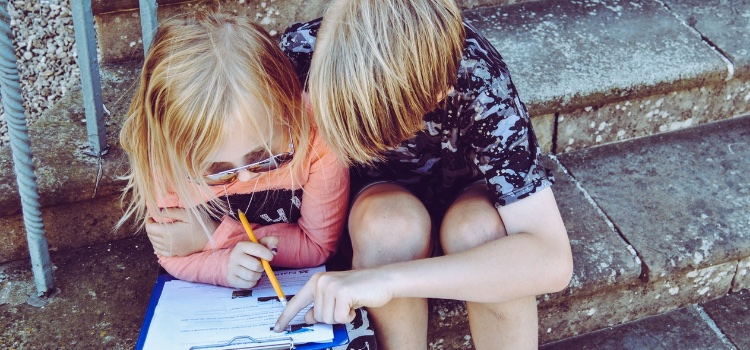In this post (article) we will be providing a giant list of suggestions and ideas for Research Papers and Psychology Research Papers. The list also displays topics for other types of academic work such as file forms, abstracts, scientific article, reviews and many others. I hope you will take advantage of this list of ideas for academic work in psychology training.
The preference of the subject of Psychology is the most significant choice that the academic needs to make for an optimal development of the Thesis and Capstone, which ends up causing a lot of distress and insecurities.
Among the hundreds of options for Thesis and Capstone topics, a good choice will ensure that the student develops their Capstone with better capacity and less problems.
First, before we start the list of suggested topics for the Capstone and Thesis of Psychology, we want to indicate tips and suggestions to facilitate your project.
We also recommend reading our post on: Psychoanalysis Capstone and Theses Project Ideas
Use Studybay to Create your Capstone or Psychology Thesis
Do you know StudyBay? It refers to a Platform where the student can designate teachers to compose their academic works of any kind such as scientific article, essay, Research Paper of Psychology or other training. You can erase any job of doing an academic psychology job with little money and no time.
Com Studybay você pode criar Apresentação de Power Point, Crítica Literária/Filme, Dissertação de Mestrado, Estudo de Caso, Plano de negócio, Portfólio, Projeto, Projeto de Pesquisa, Questões e Exercícios, Redação, Relatório, Resumo, TCC, Trabalho Acadêmico, e muitos outros. Se for do seu interesse você também pode trabalhar fazendo trabalhos para os milhares que visitam o StudyBay todos os dias, incluindo seus sites internacionais.
Just click on the button below and request your budget specifying the type of project you want to create. The teachers on the site can also assist you in developing a subject. It's like a freela site, you receive offers of varying prices and you are fully insured by StudyBay, a worldwide company that arrived in Brazil a few years ago to help you in the work of Psychology.

Monografis - Doing Your Psychology Undergraduate Course Faster
If you do not want to hire anyone to produce your academic work in Psychology, another proposal is to make use of software that will help you in preparing your Paper and Psychology Research Paper. Such a tool helps in the creation of your academic work, removing the need for all hard work and delivering in the way that the bank wants to receive.
We present the tool entitled Thesiss Capstone Advisor, it is a software capable of helping you to make your Research Paper, Capstone or any other academic work in a perfect way, with the objective of getting the highest grade.
Dissertations, theses and thousands of other works can be created faster with the help of the Research Paper that helps you with Project Ideas, simulates the project of the Capstone on the computer, supports the preparation of blocks, analyzes your writing, searches for sources and books for your theme and exports completely configured in the updated ABNT standards.
If you are unsure if you are going to purchase the platform, we recommend visiting without obligation the Capstone Theme Generator totally free that the Monografis Orientador Platform makes it possible for you.
Tips for Academic Psychology Papers
Below are some tips for preparing your academic work in Psychology, perfect tips for your Capstone or Thesis:
- If you work or know what you want to work with, look for ideas related to your area of expertise. You need to have an affinity with the theme;
- Also think about the bibliography, make sure that there is enough reference source for this theme of Capstone;
- Consult your Tutor - It is very important that the tutor Tutor agree with the topic;
The Tips and Advice below are to help you create a better Job:
- Avoid writing in the 1st person;
- direct and use only what is necessary, avoiding adjectives;
- Try not to repeat the same words too often, use synonyms;
- Avoid complicated words: the text must be simple;
- Do not hide relevant data: Reveal it whenever necessary;
For other Tips on how to do a better Research Paper, we recommend the Research Paper without Drama!
The Books and Courses Below can also help you to prepare great Academic Papers, Research Paper and Psychology Capstone. If you like it, pay a visit!
Books on Academic Papers and Capstone for Psychology
Courses on Academic Works for Psychology

List of 256 Project Ideas for Thesis and Psychology Undergraduate degree
Below are some Project Ideas for developing other academic work in Psychology:
- Absence in the presence: emotional abandonment in childhood;
- The conception of the socio-educational measure: the adolescent's view in conflict with the law;
- The contribution of play therapy in psychological care to hospitalized children;
- The hospitalized child and playing as an instrument of psychological intervention;
- Creativity from the perspective of historical-cultural psychology: an attempt to overcome its multiple conceptions;
- Consumer culture and compulsive shopping behavior: an integrative analysis of the literature;
- The experience of conflicts with the law in adolescence: infraction, social reintegration and life project;
- The figure of the imaginary friend from the perspective of psychology;
- The formation of culture and the place of the non-transferable in psychoanalysis;
- The functionality of the prison system in social reintegration;
- Adolescent pregnancy: biopsychosocial and cultural aspects;
- The importance of communication in couples therapy: a systemic view;
- The importance of gender identity among adolescents;
- The importance of Psychology for the prevention of postpartum depression;
- The importance of Psychology for the child's development;
- The importance of Psychology for human development;
- The importance of developing repertoires rich in social skills in childhood;
- The importance of psychological care in the face of the disease and getting sick;
- The importance of psychological care in the face of the disease;
- The importance of playfulness in the psychoanalytic approach;
- The importance of the psychologist for autistic people;
- The importance of psychological work: oncology in the search for quality of life in the treatment of breast cancer;
- The psychological importance of contemporary myths;
- The influence of the use of virtual pornography on sexual performance and emotional attachment;
- The influence of cartoons in the construction of children's subjectivity;
- The Winnicottian mother and the aspects that make up her maternal environment;
- Psychological expertise in cases of suspected abuse;
- The presence of psychoanalysis in the work of Machado de Assis;
- The issue of the mother-child bond and the myth of maternal love in contemporary culture;
- The question of the mother-child bond;
- Harm reduction in a CAPSad: the users' point of view;
- The parental alienation syndrome and childhood depression - a reflection;
- The widespread violence: the Stockholm syndrome and the perverse dynamics in real captivity and imaginary captivity;
- Psychotherapy experience of bereaved mothers;
- Approaches to overcome empty nest syndrome;
- Child sexual abuse and its effects;
- Child sexual abuse: emotional and behavioral consequences;
- Adoption of children with HIV: the process interfaces in living in society and shelters;
- Homoaffective adoption: psychological aspects of children adopted by same-sex couples;
- Adults with sexual trauma suffered in childhood;
- Aggressiveness: from the deconstruction of affective bonds to the presence of survival, a Winnicottian path of return to Freud;
- Alcoholism treated with psychology;
- Parental alienation in the light of psychology;
- Anosognosia and symptoms of anxiety and depression in people after stroke;
- Visualization application in mosaic charts with psychosocial data;
- The dimensions of the personality;
- The interfaces between masculinity and violence against women: a gestalt perspective;
- The greatest difficulties of a psychologist after completing his education;
- The particularities of the language of autistic children in kanner studies;
- The conceptual possibilities for the psychoanalytic clinic of limit states in Freudian metapsychology;
- Counter-transferential aspects in patients with ideation or attempted suicide: An Experience Report;
- Assertive, passive or aggressive: how does Alice behave in Wonderland ?;
- Assistance to young people in situations of social vulnerability;
- Care and care for institutionalized children and adolescents;
- Psychological care for pregnant women and parturients;
- Acts in psychoanalysis: from the flawed act to the transition to the act;
- Performance of the organizational and work psychologist in favor of workers' health: reality or utopia ?;
- Benefits of psychology for riverside communities;
- Bullying inside and outside the school context;
- Pathological jealousy: otelo syndrome;
- How to face problems in the office;
- How not to get emotionally involved with your patients;
- How to treat alcoholism with psychological;
- Considerations regarding the testimony of children and adolescents through special testimony;
- Considerations about the family relationship of people with mental illness;
- Considerations about perverse behavior and modus operandi: The case of “Maniac of the Park”;
- Contextualizing new territories of knowledge: the psychology of disaster;
- Fairy tales: a therapeutic tool;
- Countertransference looking at oneself to see the other;
- Contraversion - from the federal psychology council to the therapeutic communities;
- Corporeity, man and sexuality: a reflection in contemporary times;
- Children diagnosed with mental disorders: care spaces;
- Children with learning difficulties: the involvement of the family;
- Taking care of those who care: the mental health of workers in the home care program;
- Depression (identification, forms of treatment, causes, etc.);
- Male postpartum depression;
- Baby blues;
- Wear of family caregivers of elderly people with Alzheimer's dementia;
- Detainees: what is needed from the point of view of psychology for a change in values ?;
- Devolution in adoption processes: possible psychosocial impacts for the resettled child;
- Diabetes mellitus: psychological impact on the patient with the disease;
- Learning difficulties of EJA students;
- Learning difficulties in the literacy process;
- Difficulties of students in the public school system;
- Distortion of values and the society in which we live;
- Adolescent drugs;
- Drugs a problem in adolescence;
- Effectiveness of life coaching in resolving psychological conflicts;
- Teaching and learning: the importance of affectivity in the teacher-student relationship;
- Emotional involvement with patients;
- Leadership spirit X personality traits;
- Initial maladaptive schemes of women in situations of violence perpetrated by an intimate partner;
- Post-traumatic stress in communities with extreme violence;
- Post-traumatic stress in police and military personnel;
- Studies of psychological assessment protocols for drivers for the national driver's license;
- Evolution of the concept of "projection" in the history of Psychology;
- Expressions of psychopathy in literature and cinema;
- Contemporary family and shared custody: demands and challenges;
- Stages of child development;
- Psychology training in Brazil: an exploratory study with psychology curricula in the city of Curitiba;
- Social Formation of the Mind;
- Pregnancy and personality disorders;
- Adolescent pregnancy and its consequences and a statistic between the regions of Brazil;
- Teenage pregnancy;
- Psychological pregnancy (how to treat, ways of dealing);
- Psychological pregnancy;
- Experiential group of dreams in analytical psychology as a working methodology in mental health;
- Experiential dream groups in analytical psychology as a ritual process and performance;
- History of Brazilian Psychology;
- IDEA - The experience of family caregivers of users of a cap for children and adolescents: contributions from logotherapy;
- Gender identity of adolescents;
- Gender identity among adolescents;
- Gender identity;
- Identifying trauma with playful games;
- Importance of playful intervention in the child hospitalization process;
- School inclusion and special educational needs - teacher training and performance;
- Inclusion in schools;
- Insights about self-awareness and internet use by Psychology students;
- Intervention in children's clinic: contributions from logotherapy and existential analysis by viktor frankl;
- Playful games as a mechanism to understand traumas;
- Psychologically vulnerable abandoned youth;
- Leadership among adolescents;
- Female leadership: a review of barriers and strategies;
- Ludotherapy: children with attention deficit hyperactivity disorder - ADHD;
- Medicalization and education: attention deficit hyperactivity disorder;
- Working memory and other cognitive functions in case of learning difficulties;
- Deaths, trajectories and reputations: an anthropological study of the repercussions of a lynching;
- Evaluation method in schools;
- Music and visual arts as instruments of therapy;
- In the breastfeeding alcoves: The psychological suffering of women who have difficulties in breastfeeding;
- Neuropsychology;
- News about violence against women published in the media: a study based on behavior analysis;
- New concepts about autism: making oneself heard from psychoanalytic approaches;
- Bullying in schools (one of the topics most sought after by students who came from public education);
- Bullying in schools;
- The concept of fantasy in Freud: from abandoning the theory of seduction to the constructions under analysis;
- The effect of parental alienation on personality formation: the psychologists' conception;
- The effect of music on the reporting of feelings in functional analytical psychotherapy;
- The effect of positive parenting practices on children's emotional health;
- Human aging according to people residing in long-term institutions;
- The spectacle of the simulacrum in contemporary culture;
- Stress in caregivers of patients in home care;
- The impact of the selection process on the candidate's set of affections;
- The emotional impact on the child: the mother in the prison environment;
- The father's place in the contemporary family: a discussion from the psychoanalytic perspective;
- The look and care of the nursing team in the face of the first symptoms of postpartum depression;
- The role of psychology for management;
- The role of the father in Winnicottian psychoanalysis;
- The power of hypnosis as a functional treatment;
- The power of psychology to cure psychological illnesses;
- The psychologist in assisting victims of child sexual abuse;
- The psychologist in the justice system: an institutional discourse analysis;
- What can the current assessment method do to the student's self-esteem ?;
- What is love? Social representations of love: a necessary problematization;
- Time and madness: psychoanalytic investigation with relatives of psychiatric patients;
- The use of drugs in the context of meaning: Abuse and amor fati;
- O vínculo agressor/vitima em casos de bullying sob a perspectiva da psicologia analítica ;
- Career guidance and bipolar disorder: a case study;
- The benefits of NLP (Neuro Linguistic Programming);
- The big names of yesterday and today in psychology;
- The biggest challenges of psychology today;
- The main benefits of psychology for society;
- The recent cases of school massacres and the traumas that remained;
- Depression patients, how to identify them;
- Patients participating in the hyperdia group: what are their life changes ?;
- Patterns of beauty and racism in the construction of black women's identity;
- Parents who educate according to Modern Psychology;
- Role of the psychologist in an abusive relationship;
- Beyond the grids and rules of sociability and madness: an analysis in the judicial asylum in Paraná;
- Perception of Time and Emotion: A systematic review;
- Non-visual perception;
- Psychological expertise with guardianship councils;
- Bibliographic search: Autism and inclusion in Early Childhood Education;
- Problematizing sexuality in old age;
- Questioning the Subject in Psychology, Psychiatry and Psychoanalysis;
- Jung's individualization process: projection as a barrier to self-development;
- Attentive processes in children and adolescents with autism spectrum disorder: A systematic review;
- Promotion of autonomy mediated by art: theater contributions for young people served in social projects;
- Dispensing Protocol for Methylphenidate in the Municipal Health Network of Uberlândia (MG) from the perspective of Critical School Psychology: advances and continuities in the way of addressing ADHD;
- Maternal parenting practices and the social skills repertoire of adolescents;
- Psychoanalysis and education: a journey in Freud;
- Psychodrama in organizations: use of the “Role Paying” technique in the process of selecting people;
- Psychology applied to Human Resources;
- Psychology Applied to Administration;
- Psychology applied to advertising language on social networks;
- Clinical psychology: re-signification of eating pleasure in the treatment of anorexic patients;
- Criminal Psychology;
- Psychology of Art;
- Communication Psychology;
- Psychology of Creativity;
- Psychology of Pregnancy, Childbirth and Pueperium;
- Psychology of Pictorial Representation;
- Consumer and Advertising Psychology;
- Sport psychology: the influence of fear and anxiety on the athlete's performance;
- Psychology of the Unconscious;
- Psychology of the home: as we are all a little psychologists;
- Psychology of Fear;
- Psychology and occupational safety in the corporate sphere;
- Psychology and the consumer society: problematizing the construction of the desire for purchase;
- Psychology and Social Commitment;
- Psychology and dentistry: a necessary relationship;
- Psychology and Psychodiagnosis: An Epistemological Approach;
- Psychology and its history (evolution of concepts);
- Educational Psychology;
- Psychology in hospital emergencies;
- Forensic psychology, among many others.
- Hospital psychology and its applications;
- Hospital psychology: an institutional discourse analysis;
- Child psychology (different aspects);
- Child psychology and its importance;
- Psychology in Organizations;
- Psychology in the Workplace;
- Psychology in the public health system;
- Psychology for people with depression;
- Social Psychology;
- Transpersonal Psychology;
- Psychology focused on the treatment of drug users;
- Psychology focused on Human Resources;
- Psychopathy and the national legal system: rethinking this relationship;
- Psychosomatics and Psychology of Pain in patients with depression;
- Psychosomatics and Pain Psychology;
- Online psychotherapy: a possibility of acting for psychology in the digital age;
- Quality of life at work for the military police;
- Repress repression and trauma;
- Cognitive family restructuring through role play and group scheme therapy;
- Reflections of domestic violence on the personality;
- Positive Reports: an analysis about the experience of male homosexuals with HIV;
- Mother-baby relationship: the importance of physical contact in breastfeeding;
- Relevance of the vocational test among university students;
- Religion and psychology;
- Repercussion of the pet on child development;
- Integrative review on the psychometric properties of instruments developed in Brazil;
- Existing feelings in mothers of children with cerebral palsy: the encounter and living with the unexpected;
- Serial killers: pleasure in death;
- Female sexuality - a reading of female sexuality in Freud's work;
- Overcoming psychological trauma with a professional psychologist;
- Burnout syndrome in the workplace;
- Empty nest syndrome;
- ADHD and medicalization: a bibliographic search;
- Brazilian trends in psychological counseling for the elderly;
- Working psychology on drug addicts for an eventual cure;
- Working psychology to have a more efficient and effective self-control;
- Translation and measure of satisfaction of the functional analytical psychotherapy assessment scale;
- Trajectory of Modern Psychology;
- Autism spectrum disorder: possible impacts of the diagnosis for parents;
- Psychological disorders suffered by sexually abused children;
- Personality disorders related to pregnancy;
- Psychological treatment in cases of obesity;
- Psychological treatment to combat obesity;
- Trauma (identification, forms of treatment, causes, etc.);
- Training in customer service;
- Psychodramatic techniques;
- A critique of scientific psychology: From the phenomenology of Edmund Husserl to the ideas of Farias Brito in Brazil;
- Use of NLP (Neuro Linguistic Programming);
- Violence and women in prison: A literature review;
- Male vulnerability to the new configurations of the current woman;

Psychology Capstone Links and Videos
Structure Rules for Psychology - Undergraduate degree
The Psychology Capstone structure must follow the following parameters:
- External part
- Psychology Undergraduate Cover (Required)
- Psychology Course Spine (Optional)
- Pre-textual design elements
- Subject Cover Page (Required)
- Work Errata (Optional)
- Approval Sheet (Required)
- Dedication of the project (Optional)
- Project thanks (Optional)
- Research Paper epigraph (Optional)
- Summary in the vernacular language of the project (Required)
- Foreign Language Summary (Required)
- List of illustrations of the work (Optional)
- List of Subject Tables (Optional)
- List of Abbreviations and Acronyms (Optional)
- List of project symbols (optional)
- Research Paper Summary (Required)
- Textual Elements
- Introduction (Required)
- Work development (required)
- Completion (Required)
- Post-Textual Elements
- Subject references (Required)
- Glossary (Optional)
- Appendix (s) (Optional)








